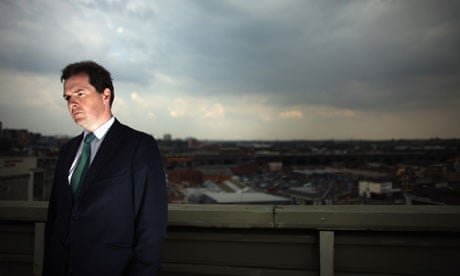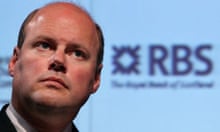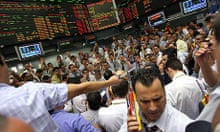In a speech last August, I warned of the perfect storm of factors that were facing the world economy and threatening to choke off its nascent recovery.
Twelve months on the winds of the storm are rising fast. And, just as in 2008, the storm is hitting from all sides: the eurozone in crisis; America in political paralysis; the pace of China's growth slowing; and markets across the world in turmoil, including in Britain.
What we need to see now is political leaders across the world getting a grip on this crisis and putting in place a plan for global growth, open trade and sustainable deficit reduction – in Europe, in the US and in the UK. In the 1930s, the world economy faced a global crisis on this scale and political leaders failed to rise to the challenge, and today my fear is that history is repeating itself.
In my speech last year, I highlighted the catastrophic government mistakes of the 1930s depression:
Ignoring the needs of jobs and growth, and abandoning any policies to support them
Insisting there was no alternative, and no policy that mattered, except rapid deficit reduction
Believing that market confidence depended solely on deficit reduction even as the markets were collapsing due to the absence of growth
Ploughing on even when the evidence showed the plan wasn't working and the fiscal position was getting worse.
Yet these are the very same mistakes that I fear are again being made. Because it is the absence of growth – in the US, in Europe and in Britain too – and the absence of a credible plan to get our economies growing again that is undermining confidence and has sent equity markets plummeting in recent days.
The idea that Britain – which has not grown for the last nine months and whose markets have fallen in the last 48 hours – is a safe haven or "not in the firing line", as the foreign secretary, William Hague, claimed, is not only complacent but patently absurd.
The government needs to recognise that what we need in Britain, and across Europe, is a plan for growth. Without growth it will not be possible to get deficits down in a sustainable way. That is why the IMF and the government's own watchdog, the Office for Budget Responsibility, have issued warnings in recent days.
Yes, things would be worse for Britain if we were in the euro. But it is deeply complacent to see this crisis as just a crisis of the eurozone, or a failure of small countries to cut spending fast enough.
This is now a truly global crisis – as continued de-leveraging by banks and the private sector, amid fears that the eurozone crisis is spreading northwards, is meeting a premature fiscal retrenchment from governments around the world and a drastic tightening of consumer spending: these three pillars of demand and growth are being ripped away at once.
Of course public borrowing will need to fall steadily over the coming years. But countries with aggressive deficit-reduction strategies but no prospects for growth now risk finding themselves trapped in a vicious circle of investor flight and slower growth, making it harder to get deficits down, and hitting market confidence.
So what needs to be done? In Europe, it is now desperately urgent that political leaders get a grip. The approach so far, simply kicking the can down the track and putting in place more austerity, won't work because it will do nothing to get growth moving – without which countries will find it hard to convince the markets they can repay their debts.
Facing up to the scale of the challenge and putting in place the necessary measures to draw a line under this crisis means doing two things now. First, the eurozone must put in place a plan for growth. That means stepping back from simply calling for more and more austerity. It means delivering export-led growth for countries beyond Germany – not shrinking demand for those countries with a collective rush to austerity.
Second, to stop the contagion, the eurozone must accept that some form of euro-area guarantees are now inevitable and that support must be there from the euro area for Italy and Spain, as well as for smaller countries like Greece.
In America, too, a credible deficit reduction plan requires the US economy to be growing and creating jobs. Recent developments in America remind us that to be credible a deficit plan needs political agreement – which has been the problem in the US in recent weeks.
But political agreement is not enough, it also needs to work. That is why I am fearful that Republican congressional leaders have learned the wrong lesson from the British experience over the past 12 months.
The lesson from the UK is that George Osborne's plan – trying to go too far and too fast with a plan driven by a political timetable rather than sensible economics – isn't working. Last year's recovery has been choked off, when it should have been secured.
The danger for the US is that, just like the UK, worries about deep cuts, before the economy is seeing a strong recovery, hit confidence of consumers and investors leading to slow growth which makes it harder to get the deficit down.
But there is another lesson from the 1930s, one that we assumed had been learned and fixed for good. Never again, that generation said, would the world face an economic crisis and respond with isolationist politics. We would recognise the need for global coordination and agreed action, including on global trade, not sit in our bunkers hoping the storm would pass.
That is why I find it so worrying that the British government is absent from the global economic debate at this critical time. A year ago I argued that while Britain could never isolate itself from these forces, the Conservative-led government did have a duty to prepare for them, and build up our defences.
Instead it did the opposite: withdrawing government support for jobs and growth, hitting consumers with tax rises and stoking high inflation. It was like ripping up the foundations of the house before the hurricane hits.
A year ago, coalition politicians preferred to believe Osborne's confident claims that his rapid deficit-reduction strategy was not only essential but desirable, clearing the path for a strong, private sector-led recovery.
But that reckless confidence has now given way to staggering complacency. In recent weeks we have seen Osborne describe 0.2% growth in the last nine months as "positive news". He boasts about Britain's falling bond yields, not apparently realising that this is reflecting a collapse in market expectations for growth.
And at the beginning of this week, with the chancellor on holiday, the Treasury talked of Britain as a "safe haven" for investors - just before successive days of losses wiped billions off the stock market.
Beyond Osborne's office, where flat-lining growth is treated as an irrelevance, there is a genuine debate raging about how to get the UK economy back on track.
But whether you believe in a plan B, a plan A plus or a wholly different approach, we can surely agree on this: things cannot go on as they are, the world is desperately in need of strong and united leadership in the face of this new crisis, and we need our political leaders to step up to the plate.
On every occasion in recent decades when the world faced economic turmoil, it was the British chancellor at the head of the table, knocking heads together and coordinating the response.
We led the way on global financial reform after the Russian default; we were at the centre of world efforts to stabilise the world oil price after the Iraq war; and most notable of all, it was the UK which led the global response to the 2008 banking crisis and stopped the collapse of Lehman Brothers escalating into a world depression.
And the same was true under Conservative governments. Even when it was already clear that Britain would not join the first wave of the euro, Ken Clarke banged the table to get the EU stability pact agreed at the 1996 Dublin summit.
Outside the eurozone, and – unlike the US, France and Germany – without imminent elections to worry about, the UK government should once again be leading the way, because whether the eurozone gets its act together matters hugely for British jobs and pensions.
Instead, there is a gaping hole where British leadership should be. That is not just the result of ill-timed and badly coordinated holiday plans; it is symptomatic of 15 months in government that have not only left the British economy weak and vulnerable, but also made zero contribution to global economic discussions.
Instead, trapped by its own political ideology and unable to admit the need for a change of direction, this government prefers to believe this is just a crisis of the eurozone and the US and that Britain need not worry. David Cameron and Osborne should be taking the lead. Instead, we hear only a complacent and deafening silence.





